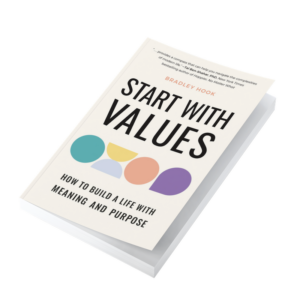Human values represent things that are important to us. Just like our DNA or our fingerprints, we all have a unique set of values that shape our emotions, thoughts, and actions.
Whether we are aware of it or not, our core values play a fundamental role in determining who we are and how we approach life. Discovering our core values is an essential step toward personal and professional growth.
In this article, you’ll discover two lists of values.
- Our research-based list of the 48 essential core values, grouped into the four Values Pyramid categories. These categories are Belonging, Growth, Impact, and Fulfillment.
- Our comprehensive list of 101 core values, which is sorted alphabetically.
The List of Core Values
If you’d prefer a downloadable, print-friendly PDF version of our values list, you are welcome to access this free resource below.
For those of you who prefer to stay on this web page, please review the following values categories. When selecting values, think about how you are rather than how you would like to be.
You’ll want to aim for a maximum of 5 core values. Remember, the point is to uncover the essence of what matters most to you rather than selecting everything you desire.
| Belonging Love Friendship Respect Fairness Community Empathy Kindness Intimacy Family Teamwork Collaboration Inclusion | Growth Learning Achievement Curiosity Balance Physical Fitness Mental Fitness Skill Mastery Resilience Adaptability Creativity Courage Honesty |
| Impact Influence Status Wealth Credibility Risk-Taking Autonomy Leadership Advocacy Visibility Authority Accomplishment Reputation | Fulfillment Peace Gratitude Wisdom Spirituality Social Contribution Nature Stewardship Vocation Philanthropy Transcendence Legacy Altruism Awe |
In addition to using a list such as the one above, there are many other ways to discover your core values. We explore this topic deeply in the Values Course, which is designed for those seeking a guided learning experience.
An Alphabetical List of 101 Core Values
For a more comprehensive list of values, not grouped by any specific categories, we’ve compiled the following list. This list is perfect for organizations or individuals wishing to explore a wide spectrum of possible core values.
- Accountability
- Adaptability
- Altruism
- Ambition
- Authenticity
- Balance
- Boldness
- Compassion
- Commitment
- Cooperation
- Courage
- Creativity
- Curiosity
- Determination
- Diligence
- Discipline
- Diversity
- Empathy
- Equality
- Excellence
- Fairness
- Flexibility
- Freedom
- Generosity
- Gratitude
- Harmony
- Honesty
- Honor
- Humility
- Improvement
- Independence
- Individuality
- Influence
- Innovation
- Inspiration
- Integrity
- Inclusivity
- Joyfulness
- Justice
- Kindness
- Leadership
- Loyalty
- Mindfulness
- Moderation
- Open-mindedness
- Optimism
- Originality
- Passion
- Patience
- Perseverance
- Persistence
- Precision
- Pragmatism
- Professionalism
- Proactivity
- Prudence
- Punctuality
- Purity
- Quality
- Quietness
- Realism
- Reflection
- Reliability
- Respect
- Respectfulness
- Responsibility
- Resilience
- Resourcefulness
- Security
- Self-control
- Self-improvement
- Service
- Simplicity
- Sincerity
- Solidarity
- Spirituality
- Spontaneity
- Stability
- Supportiveness
- Sustainability
- Sympathy
- Teamwork
- Thoughtfulness
- Thrift
- Timeliness
- Tolerance
- Tranquility
- Transparency
- Trust
- Trustworthiness
- Understanding
- Uniqueness
- Unity
- Vitality
- Volunteering
- Warmth
- Watchfulness
- Willpower
- Wisdom
- Zeal
- Zest


